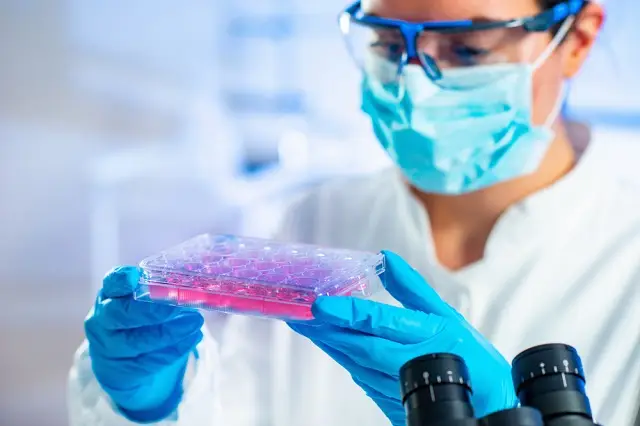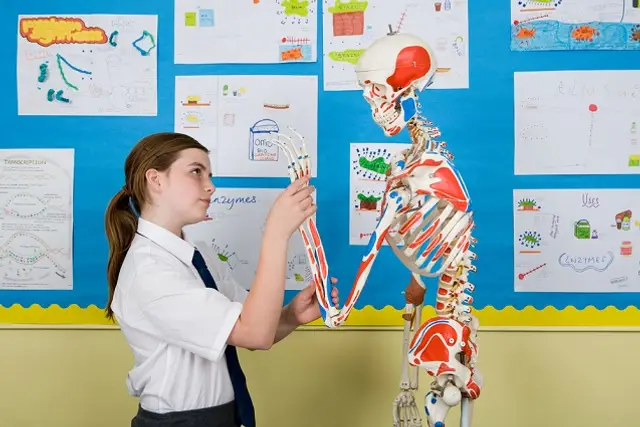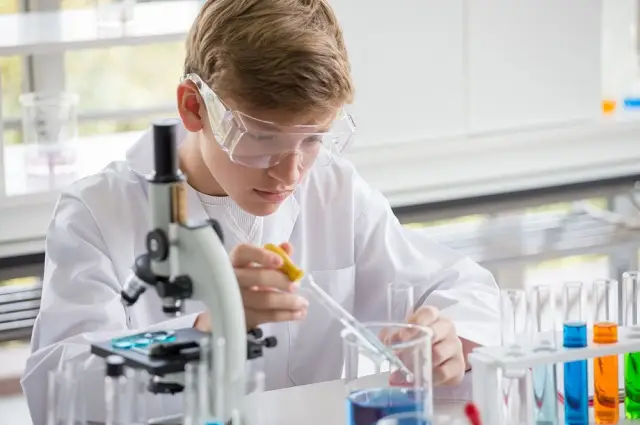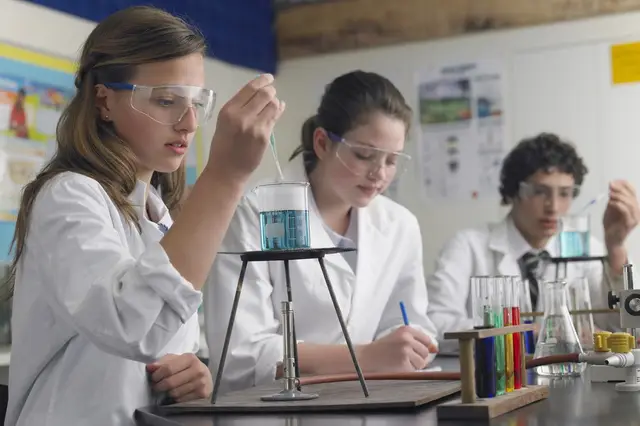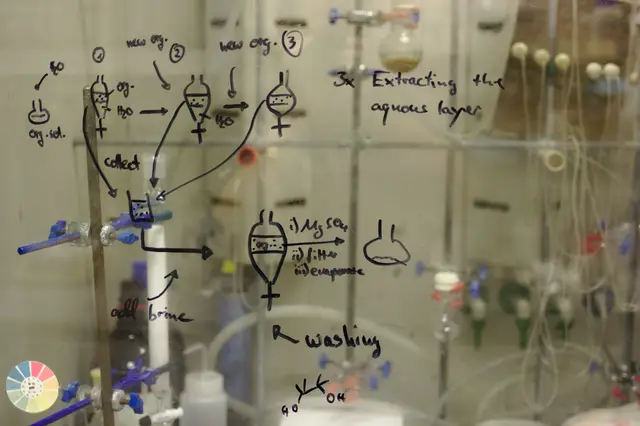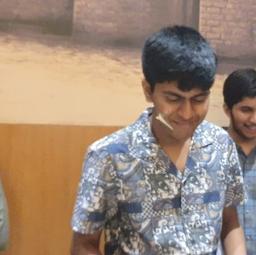Chemistry is a diverse field with various branches that focus on different aspects of matter and its interactions. Here's a quick overview of some major types of chemistry study:
Organic Chemistry focuses on carbon-based compounds, including hydrocarbons and their derivatives. It is essential for drug discovery and the synthesis of materials such as dyes and fuels.
Inorganic Chemistry focuses on inorganic compounds such as minerals, metals, and catalysts, which often exclude carbon. It is used to create fertilizers, paints, cosmetics, and batteries.
Physical Chemistry delves into the fundamental principles governing chemical reactions, with applications in developing new energy sources and understanding molecular interactions. It is used to study thermodynamics and quantum mechanics.
Analytical Chemistry are techniques used for analyzing the composition of substances. Examples include chromatography, and spectroscopy.
Biochemistry focuses on the chemical processes within and related to living organisms.
It contributes to advancements in medicine, genetics, and biotechnology, and ttopics for this sort of research include enzymes, metabolism, and molecular biology.
Environmental Chemistry seeks environmentally sustainable practices, promoting cleaner production methods and reducing the environmental impact of chemical processes. Research here might be done on pollution, climate change, and sustainability.
Theoretical Chemistry is the practice of developing and applying theoretical models to understand chemical phenomena more generally. This might include computational chemistry, quantum chemistry.
Nuclear Chemistry is the specific study of nuclear processes and properties of radionuclides. Relevant topics include radioactive decay and nuclear energy.
These branches often overlap, and interdisciplinary research is common in modern chemistry. If you want a career involving chemistry research, you might become a pharmaceutical researcher, an environmental scientist, a materials engineer, a flavor chemist (creating the tastes and scents in foods), or a forensic chemist who analyzes crime scene evidence to support investigations. Research can take place in laboratories, industrial settings, universities, or even in the field, investigating the chemical makeup of natural environments. Chemistry research, in its diverse forms, fuels innovation and addresses critical global issues, making it an exciting and impactful field for those interested in understanding and shaping the world at the molecular level.
Start by talking to your chemistry teacher or any science teacher you admire. They can guide you on relevant courses, extracurriculars, and even suggest fun experiments you can try at home. Participate in science clubs or join a local STEM organization where you can meet like-minded peers and mentors. Attend science fairs or workshops to get hands-on experience and discover specific areas of chemistry that pique your interest. Consider volunteering at science-related events or intern at a local lab if possible—it's a fantastic way to gain practical experience. Read about the latest breakthroughs in scientific journals or magazines, and maybe even start a science blog to share your discoveries. And remember, chemistry can be quite complex. It's okay not to have everything figured out right away—exploring and enjoying the learning process is a big part of the journey. Here are some high school classes, books, and extracurriculars to get you going on your chemistry journey.
1. Take a Class in High School
Obviously you would want to take as many chemistry classes as your high school offers. Given the chance, opt for honors, advanced, or AP courses that give you a more in-depth exploration of chemistry topics, often covering additional subjects such as thermodynamics, kinetics, and equilibrium. The availability of advanced courses such as Organic Chemistry, Biochemistry, and Forensic Chemistry can vary between schools. If you're passionate, consider talking to your school's guidance counselor or science department about pursuing an independent study or an additional class at a local community college. (If you want to progress to more advanced levels on your own, you can also pursue virtual classes on MIT OpenCourseWare, Coursera, MITx, and Khan Academy.)
Other relevant coursework:
Calculus is fundamental for understanding the mathematical concepts behind chemical reactions, rates, and thermodynamics. It's particularly important if you're considering a career in theoretical chemistry or research.
Computer Science is helpful because computational chemistry is a growing field. Learning programming languages and computational techniques can be advantageous, especially if you're interested in simulations and data analysis.
Environmental Science provides insights into how chemistry interacts with the environment, important if you want to help address pollution and sustainability issues.
Statistics is crucial for designing experiments and analyzing data. Whether you're in a lab setting or involved in research, understanding statistical methods enhances your ability to draw meaningful conclusions from experiments.
Public Speaking can help you convey complex ideas clearly, which is vital in research, teaching, or any role where you need to articulate scientific findings.
Art or Graphic Design skills are increasingly important in scientific communication. Whether creating visuals for presentations or designing figures for publications, a background in art or graphic design can make your work more accessible and engaging.
Ethics or Philosophy are crucial in helping you understanding ethical considerations, especially if you're involved in research with potential societal impacts.
Business classes provide insights into project management, budgeting, and the practical aspects of running a lab or a company.
These classes offer a well-rounded education, preparing you not only with a strong foundation in chemistry but also with additional skills that can set you apart and open up diverse career paths within the field.
2. Read a Book
From deciphering the periodic table to delving into genetic wonders, these books offer an intellectually challenging yet (mostly) accessible plunge into the captivating world of atoms and elements. While some of the larger tomes might seem formidable, take it slow and team up with online resources and discussion for help. You can also complement your reading with documentaries and podcasts, letting the authors' enthusiasm guide your own research.
Foundational Classics:
The Feynman Lectures on Physics by Richard P. Feynman, Robert B. Leighton, and Matthew Sands (1963) - While primarily focused on physics, Feynman covers fundamental concepts in chemistry, making complex topics accessible to a wide audience. Feynman was also legendary for his (often humorous) live lectures, which you can find on YouTube.
The Double Helix: A Personal Account of the Discovery of the Structure of DNA by James D. Watson (1968) - This work gives you a glimpse into the world of molecular biology and the relationship between chemistry and biology.
The Periodic Table by Primo Levi (1975) - Levi, a chemist and Holocaust survivor, weaves autobiographical stories around elements from the periodic table, offering a unique and personal perspective on chemistry.
More Recent Works:
The Disappearing Spoon: And Other True Tales of Madness, Love, and the History of the World from the Periodic Table of the Elements by Sam Kean (2010) - Kean explores the fascinating stories behind each element, making the periodic table come alive and demonstrating the human side of chemistry.
Stuff Matters: Exploring the Marvelous Materials That Shape Our Man-Made World by Mark Miodownik (2013) - Miodownik delves into the chemistry of everyday materials, from concrete to chocolate, making the subject accessible and highlighting its impact on our daily lives.
The Gene: An Intimate History by Siddhartha Mukherjee (2016) - While more focused on genetics, this book provides a comprehensive exploration of the science behind the gene, touching on the intersection of chemistry and biology.
To supplement your reading and stay updated on the latest developments in the field, you should consider following reputable chemistry journals and news outlets, such as Nature, Science, and Journal of the American Chemical Society. Additionally, magazines like Chemical & Engineering News provide accessible updates.
You can also follow online platforms like Chemistry World, ACS Reactions on YouTube, and TED-Ed for engaging videos, articles, and discussions on current developments in chemistry. Chemistry-related podcasts such as "The Infinite Monkey Cage" and "Chemistry in its Element" are fun ways to give more context to what you may be learning at school.
3. Extracurricular Study
Spending time outside of school getting hands-on chemistry experience can greatly enhance your skills. And these extracurricular activities are not just about building your resume but also about genuinely exploring your interests and passions and meeting like-minded peers. Here are some options:
Chemistry Olympiad - Participate in local or national Chemistry Olympiads. These competitions involve challenging problem-solving and lab work, honing your analytical and practical skills. Success can also open doors to prestigious programs and scholarships.
STEM Club and Outreach - Volunteer in STEM outreach programs for younger students or your community. Design and lead interactive chemistry demonstrations, fostering your teaching and presentation skills while sparking an interest in science among others.
Chemistry Podcast - As a related exercise, or on its own, you can start a STEM podcast with a focus on chemistry. Research and discuss interesting topics, interview professionals, and enhance your science communication skills. This initiative not only broadens your knowledge but also hones your ability to articulate complex concepts.
Molecular Gastronomy or Cooking Club - Start a molecular gastronomy or just a simple cooking club. Explore the science behind food, experimenting with techniques like spherification and foaming. This interdisciplinary approach combines chemistry with culinary arts, expanding your scientific creativity.
Volunteer Lab Assistant - Reach out to local universities or hospitals to see if you can shadow lab workers. Assisting with even the simplest of lab tasks can give you valuable exposure to systems and techniques.
We acknowledge that finding chemistry research opportunities in labs can be challenging for high school students. You may lack the specialized knowledge and skills typically expected in research environments. Limited resources and funding as well as safety protocols within universities can make it difficult to train high schoolers. Moreover, the competitive nature of research positions, even at basic level, means that opportunities may be snatched up first by college undergrads. However, despite these challenges, persistence, proactive outreach, and leveraging online resources can help you secure valuable research experiences.
Start by reaching out to your school's science department or local universities and just see what’s available. Your best chances are at summer research programs, both online and in-person, specifically designed for high schoolers. Let’s explore some options and tactics in more detail.
Find research programs close to home
To find chemistry research opportunities close to home, check out our High School Student Research Opportunities Database. Click on your state, then search based on your location, institution, event type (in-person or virtual), and tuition (paid or free).
Work with a professor
If you have a clear project idea, you can reach out to professors in your field to see if they are open to collaborating with you. Refer to our Guide to Cold-Emailing Professors (written by Polygence literature research mentor Daniel Hazard, a Ph.D. candidate at Princeton University).
Engage in your own research project
While you may face limitations in terms of access to advanced equipment and resources, you can design projects using commonly available materials and basic lab equipment. Make use of online resources, books, and your school's laboratory facilities. Carly Taylor, a Stanford University senior who has completed several research projects this way, outlined a guide about how to write a self-guided research paper. By reading it, you’ll get a better understanding of what to expect when taking on this type of project.
Independent projects may require extra effort, but they offer valuable learning experiences, demonstrating initiative and passion to colleges or future employers.With determination and creativity, high school students like you can even make meaningful contributions to the field of chemistry through independent research. If you would like a little guidance and support with your independent project, you can also choose to work with one of our Polygence chemistry mentors.
Enter a competition
The requirements and deadlines that competitions require you to meet provide a very helpful structure to keep your research moving forward. For some ideas, check out our post Top 10 Science Fairs and Competitions for High School Students. Another benefit to attending a competition is that you will meet other students, teachers, and even experts in the field you love most.
Here are some top picks for summer chemistry research programs. We chose them based on a combination of their affordability, name recognition, social opportunities, and academic rigor.
1. Summer Science Program (SSP)
Hosting institution: Various
Cost: $8,400 (but most qualify for discounts)
Format: In-person (Host campuses include New Mexico Tech, University of Colorado, Purdue University, Indiana University, Harvey Mudd College, Caltech, and MIT)
Application deadline: Early March
This 5-week “educational experience of a lifetime” is open to high school juniors. Running since 1959, SSP immerses its 12 research teams (of 3 participants each) in a difficult research project. Past programs have included astrophysics, biochemistry, and genomics. You will also attend guest lectures, go on various field trips, and meet other brilliant kids from all over the world. The program fee is scaled to what each family can afford.
2. Research in Science & Engineering (RISE)
Hosting institution: Boston University
Cost: $5,620-$8,908
Format: In-person (Boston, MA)
Application deadline: Early February
RISE is a 6-week, 40-hour-a-week program for rising high school seniors who want to major in STEM and work in the field. Astronomy, Chemistry, Computer Science, and Neurology are just a few of the research track options. You will work on research projects with Boston University professors, postdoctoral fellows, or graduate students as advisors. They also participate in weekly peer-to-peer training. The event culminates in a poster discussion, where participants present their work.
3. Project SEED Summer Program
Hosting Institution: American Chemical Society (ACS)
Cost: Typically free
Application Deadline: Late April, varies by location
Project SEED is a unique initiative that gives economically disadvantaged hands-on research experiences in chemistry. The program aims to foster a passion for scientific exploration and support underrepresented students in pursuing STEM careers. Participants collaborate with mentors on research projects, gaining practical laboratory skills. Project SEED typically covers program expenses, making it accessible to a broader range of students. Application deadlines may vary, so check with your local ACS chapter for specific details on how to apply.
4. Research Science Institute (RSI)
Hosting institution: Center for Excellence in Education (CEE)
Cost: Free
Application deadline: Early January
Note that RSI is highly selective and only admits about 80 high school students each year from a pool of thousands of applicants. Check out “How to Get Into Research Science Institute (RSI)”, our entire post dedicated to tactics for increasing your chances of being accepted. The program is hosted at the Massachusetts Institute of Technology (MIT). Students are selected based on their academic achievements, research potential, and personal qualities such as creativity, leadership, and motivation. RSI is free, with all expenses paid (including travel, room and board, and research supplies). Also be sure to check the site for the most current application information.
5. Simons Summer Research Program
Hosting institution: Stony Brook University
Cost: Paid fellowship
Format: In-person (Stony Brook, NY)
Application deadline: Early February
Also known as the Simon Fellowship, this prestigious and highly selective 8-week program matches about 30 students each year with a Stony Brook faculty mentor in various fields, including chemistry. Students are selected based on their academic achievements, research potential, and personal qualities such as creativity, curiosity, and dedication. This program gives you a great opportunity to join research groups, produce a research abstract, work with a supportive community of peers and mentors, plus receive a stipend award. Check the site for the most current application information.
For a full list of our recommended summer program read Top Chemistry Summer Programs for High School Students
Ensuring the safety of high school students and providing the necessary supervision can be challenging for research institutions and laboratories, which is part of the reason why chemistry internships can be difficult to come by. Competition from college-level students with more skills and experience in the lab is another reason. Some opportunities do exist, however, and it’s always worth checking out colleges in your area to see if they offer opportunities for qualified high school students.
1. NASA Internships for High School Students
Hosting institution: NASA
Location: Varies
Deadline: Varies
Compensation: Varies
NASA provides internship opportunities for high school students interested in various STEM fields, including chemistry. Interns work on projects related to space exploration, earth science, and technology.
2. Broad Summer Scholars Program (BSSP)
Hosting institution: Broad Institute of MIT and Harvard
Location: Cambridge, MA
Deadline: Late January
Compensation: $3,600 stipend
The Broad Summer Scholars Program offers high school students the chance to engage in genomics and biomedical research. While not exclusively focused on chemistry, the program covers interdisciplinary aspects of scientific research.
3. Anson L. Clark Scholars Program
Hosting institution: Texas Tech University
Location: Lubbock, TX
Deadline: Mid-February
Compensation: $750 stipend
This paid 7-week internship offers exceptional students interested in chemistry the opportunity to work with outstanding professors at the University's General Health Sciences Center. Although the program is research-based, it also includes weekly hands-on seminars, discussions, and field trips. We’re very impressed by this program’s academic rigor and its on-campus experience with zero cost to the student. The only catch is that only twelve students are selected every year.
Looking for more internships? Read our post on Top Chemistry Internships for High School Students
Start by exploring topics that really matter to you. Maybe it's related to sports and the chemical composition of popular sports drinks or the impact of household products on the ecosystem or the chemistry of fragrances. Consider real-world problems and applications. Talk to your teachers, read scientific journals, and attend local science events to discover emerging trends and keep a list of ideas.
Polygence Scholars Are Also Passionate About
Here are some ideas that show you how you can blend real-life passions with chemistry to develop a deeper understanding of its applications.
What's in my water?
Most water contains heavy metal ions such as copper, iron, and zinc. Not all metal ions are bad but at high concentrations they can be unsafe. In this project you could collect water samples within your community and measure the metal ion levels such as ferric and ferrous water. Research techniques for how to accurately measure metal ion levels in water. In this project, you’ll learn more analytical chemistry techniques and explore a question relevant to public health.
Idea by chemistry research mentor Grace
Battery storage
Batteries are proving to be a great way to store large amounts of energy from intermittent renewable sources. This project could involve researching current battery technologies and showing through graphs or some other visual representation of how much battery storage a city (or state/province) would need to run 100% off of renewable sources.
Idea by chemistry research mentor Landon
Metals for life
If asked about metals important to life, chances are iron and calcium would first come to mind, as they are important parts of our blood and bones. There are many more metals that are needed for essential biological functions, however. In this project you will dive into scientific literature to learn about different life metals, find out what their roles are in biology, and learn what kind of life forms need them. You will also learn about the newest addition to the life metals - the lanthanides. Then, choose one life metal and review two recent scientific articles involving your metal of choice. Finally, generate a description of the metal's function in biology. Your creativity is the limit as to how you show the importance of metals for life.
Idea by chemistry research mentor Nathan
When brainstorming research ideas, it's also important to consider the real-world relevance of your chosen topic. Think about how your research can address practical issues or applications. This could lead you into areas such as renewable energy, climate change, medicine, or materials science, where the impact on the real world is evident.
For more inspiration read 12 Chemistry Project Ideas for High School Students
Here are some inspiring chemistry projects done by some of our Polygence Scholars.
Inclusion of Photolyase in Sunscreen and its Effects
Interested in preventing skin cancer, Natasha hypothesized that incorporating enzymes from organisms, specifically photolyase and T4 endonuclease V, known for repairing cyclobutane pyrimidine dimers (CPDs), could be an effective strategy to reduce UV-induced DNA damage in humans. To test this hypothesis, her study reviewed existing research on the efficacy of these enzymes in repairing CPDs in humans, finding promising results. Check out her full research paper.
N-Carbon Quantum Dots for Chromosome Imaging
Fascinated by genetic research, Betül wanted to make nitrogen-doped carbon quantum dots (N-CQDs) using a cost-effective, bio-sourced method from radish, enhancing their fluorescence and DNA-binding properties. Chromosome imaging confirmed N-CQDs' ability to bind to chromosomes, outperforming DAPI under the FITC filter. Her findings suggest N-CQDs' potential advantages in genetic research applications, offering an economical and efficient alternative to traditional methods. Read the research paper.
African Herbal Remedies: The Healing Abilities of Nature's Gift
Nicolette explored the healing properties of traditional African herbal remedies, focusing on their application in curing Typhoid, Malaria, and COVID-19. Acknowledging the ancient roots of herbal medicine in Africa, the study aimed to understand its evolution and the reasons behind its decline. Her research highlighted their cultural acceptance, compatibility with the human body, and minimal side effects. She also addressed the challenges leading to the declining use of this medicinal practice. Read the research on her website.
Check out all the chemistry research projects done by Polygence Scholars.
Once you have chosen a compelling and focused research question that you’re excited to research, start by clearly defining the purpose of your study. Try to establish a hypothesis or objective.
Next gather your research materials and start to conduct a thorough literature review to understand all of the existing research on the topic. As you gather information, you can begin outlining your research paper. The format of a chemistry research paper typically includes:
Abstract - A concise overview of the paper's objectives, methods, results, and conclusions.
Introduction - Clearly state the research question, hypothesis or thesis, and the significance of the study.
Methodology - Outline of the experimental approach, including the procedures and equipment used in the experiments.
Results - Include tables, charts, graphs, and equations to present data. Analyze and interpret the data, discussing any patterns, trends, or deviations.
Discussion - Interpret the results, relate them to the research question, and consider their broader implications.
Conclusion - Summarize the key findings and their significance.
References - Cite all sources, including previous research and relevant literature. Citations follow a specific style (e.g., APA, MLA).
Outstanding papers showcase critical thinking, creativity, and a thorough understanding of the scientific method. Discuss any unexpected outcomes or challenges faced during the research process, demonstrating adaptability and problem-solving skills. Ensure your conclusions align with your findings and tie back to your initial research question. Additionally, consider the broader implications of your research within the field of chemistry or its real-world applications. If applicable, propose future research directions.
Finally, edit your paper for clarity, coherence, and proper formatting. Seek feedback from teachers, peers, or mentors to refine your work. A well-organized, insightful, and meticulously researched paper, coupled with your passion for the subject, will undoubtedly make your chemistry research paper outstanding. If you get stuck, remember: It's not just about the results but the journey of exploration and discovery you convey through your writing.
If you need more general guidance overall, here’s a great article on how to write a good research paper. Also, if you have some ideas and want the support of a skilled expert, you can work with a Polygence chemistry mentor.
Once you’ve researched, written, and perfected your research paper, it’s time to introduce it to the world. You could enter it at a science fair or publish it in a journal. Publishing your research in a peer-reviewed journal can take the great work you’ve already done and add credibility to it. It also makes a stronger impression than unpublished research. The process of having your work reviewed by advanced degree researchers can be a valuable experience in itself. You can receive feedback from experts and learn how to improve upon the work you’ve already done.
Here are some publications you could look into.
1. The Journal of Emerging Investigators (JEI)
JEI is an online, peer-reviewed journal that publishes research by middle and high school students in various scientific disciplines, including chemistry. Please note that JEI requires that a teacher, mentor, or Principal Investigator of a lab submit your research on your behalf.
Cost: Free
Deadline: Rolling
Type of research: Original research in the biological and physical sciences written by middle and high school students.
2. Journal of High School Science (JHSS)
The Journal of High School Science is a peer-reviewed quarterly publication showcasing high school student research in the realm of science (including chemistry, technology, engineering, arts, and mathematics.
Cost: Free
Deadline: Rolling
Type of research: STEAM-based research or innovations by high school students.
Regarding getting your project accepted and published at these or any other peer-reviewed journal: Be prepared for the possibility of rejection or revisions. Scientific publishing is a competitive process, so maintain a positive attitude and be persistent in your efforts to improve and disseminate your research. (Quote from The Journal of High School Science website)
3. The Young Scientists Journal (YSJ)
YSJ is a student-run journal that publishes research from students worldwide across various scientific disciplines, including chemistry.
Cost: Free
Deadline: Rolling
Type of Research: YSJ accepts original research articles, reviews, and essays, providing a platform for high school students to share their scientific contributions.
4. Research Archive of Rising Scholars
You can also showcase your work in The Research Archive of Rising Scholars (RARS), an open-access preprint archive for research articles written by young scholars, like you, from around the globe. Having your work circulated through RARS means that you’ll have a link to share with others so that they can read and engage with the research you’ve completed. Since this is a non-peer-reviewed preprint server, students who showcase their work on RARS can decide at any point to submit their work to a journal or competitions for consideration.
Looking for other ways to showcase your research? Be sure to read our list of Chemistry Competitions for High School Students article
